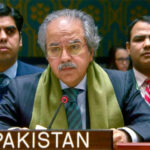SINEM CENGIZ: For the next two years, two countries in the Middle East and North Africa region will host the annual UN climate change conferences. Egypt will host COP27 this month and the UAE is due to host COP28 next November. The world’s most prominent climate change summits will allow countries in the region to highlight their climate challenges, shed light on the importance of multilateralism to restore the MENA ecosystem, and focus on the geopolitical factors related to climate diplomacy.
This is not the first time that MENA countries have hosted the climate change conferences. Previous annual forums were held in Morocco in 2001 and 2016, and in Qatar in 2012. However, no serious action has been taken since then regarding climate-related problems. This is due to several factors, including a lack of serious awareness among people in the region about the severity of the issue; lack of a proper scientific research relevant to this region; lack of seriousness among governments downplaying the effects of climate change; and, most importantly, a lack of cooperation among countries in the region when it comes to solving their common and most dangerous future problems: climate-related migration, and food and water scarcity.
Despite the fact that MENA is vulnerable to drought, flood, fire, food and water insecurity, this region has been a relatively small actor at the global climate change diplomacy table. However, as threats to food, water and health become a part of national security, countries in the region have started to place climate change at the center of their policy implementations and take a more active role in the global arena in regards to climate diplomacy.
In particular, the consequences of Russia’s invasion of Ukraine on food and energy security has exacerbated the importance of multilateral cooperation on climate-related problems. Shocks to the global food supply chain caused by the Russia-Ukraine war have again highlighted the MENA region’s food-security challenges, as well as the importance of food security.
The MENA region has struggled with water challenges and extreme temperatures for years. Growing population and conflicts have turned the spotlight on these challenges with greater urgency. Aisha Al-Sarihi, a Gulf scholar specializing in climate change-related problems, argues that the Arab uprisings that swept the MENA region were linked to climate change. She believes that protests in Tunisia in 2011 were the result of drought that affected food prices and led to conflict. Thus, she links climate change to the national security and stability of states, suggesting governments integrate climate change into their policy implementation strategies.
Climate-related problems, such as water scarcity, have also been a source of conflict between neighboring countries in the region, including Turkiye, Iran, Iraq and Syria, which view the issue from a national security perspective. Transboundary water plays a critical role in sustainable development of these countries and, thus, induces huge potential risks and benefits associated with development.
Iraq is the most vulnerable of these countries to the effects of climate change, including water and food insecurity. Iraq may be oil rich, but it is plagued by poverty after decades of war. The same applies to Syria. Falling water levels in the Tigris and Euphrates rivers are a huge concern for Syria and Iraq, which are both engulfed by instability with no end in sight.
Turkiye also faces challenges in management and development of water resources, while working on maintaining water quality, and is expected to become a water-stressed country by 2030. Population growth and economic development are the two most serious challenges in regards to water, energy and food security.
In the past, the transboundary water issue has even brought Turkiye and its neighbors to the brink of crisis, yet there is still no mutual understanding on this issue. These countries are now at the brink of climate disaster. Mutual cooperation is no longer a matter of bargaining, but a necessity for survival. Scarcity of water and food is a serious threat to national security, as much as conventional threats. In recent years, several agreements on climate change have been inked among countries in the region, such as the UAE, Turkiye and Saudi Arabia, which are also committed to reaching net-zero emissions in the next 25 to 40 years.
Therefore, Egypt’s hosting of COP27 this year comes at a critical juncture. It not only shifts the center of gravity in climate diplomacy to the MENA region, but also offers countries in this region the chance to play key roles in climate change adaptation and mitigation. It will also allow countries such as Turkiye, Iraq and Iran to focus more on their common climate-related problems and turn the water issue from a source of tension to a tool of cooperation.
Author: Sinem Cengiz is a Turkish political analyst who specializes in Turkiye’s relations with the Middle East. Twitter: @SinemCngz







